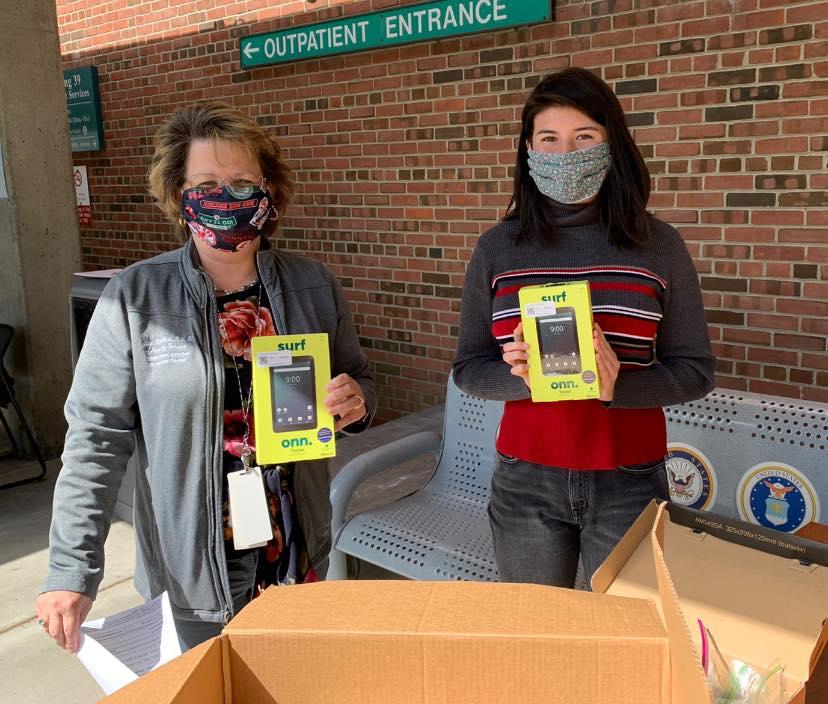UVM students collect smart devices to help Vermont community
Volunteer Lia Rubel (right) holds up a donated smart phone as part of a project to help veterans access telehealth during the pandemic.
With the help of UVM students, smart devices are being donated to state veterans, who cannot safely or easily attend their medical appointments in person during the COVID-19 pandemic.
The Vermont branch of Telehealth Access for Seniors, a nonprofit nationwide organization working to provide 100 free smart devices and tech support to elderly and low-income communities, is now working with White River Junction Veteran’s Association to donate to state veterans.
Telehealth is the use of electronic communication devices, such as smartphones, to “support long-distance clinical health care, patient and professional health-related education, public health and health administration,” according to the Office of the National Coordinator for Health Information Technology website.
Volunteers gather donated smart devices or money donations across the state and give them to organizations connected to seniors and low-income communities, which will then be distributed to high-risk individuals.
Both instructions with each device and online tech support are also provided for free.
In Vermont, eight volunteers, seven of whom attend UVM, are currently gathering donated smart devices to send to White River Junction Veteran’s Association, where the devices will be distributed accordingly.
Enabling high-risk people to talk to their doctors while safely at home is important, said Mimi Hsu, a UVM rising senior studying biochemistry and a Vermont state coordinator.
“People don’t consider the risk involved for people with chronic conditions who still need to go to the doctor’s office during the pandemic,” she said. “It’s especially important in Vermont because of how rural it is here and how many elderly and disabled patients there are.”
Vermont has a high percentage of elderly people, with 18.1% of the state population being 65 years or older in 2017, compared to the national average of 14.9%, according to the U.S. Census Bureau.
Vermont also has a high veteran population of 8.89% in 2017, compared to the national average of 6.60%, according to the U.S. Department of Veteran Affairs.
Telehealth is critical for Vermont’s large elderly and veteran population to access, said Lia Rubel, a rising sophomore at Emory College and the national grants and partnerships lead.
“It can be difficult for them to get access to telehealth because they don’t own a smart device and they don’t have the know-how to use them,” Rubel said.
Veterans are especially high risk because they are more secluded with social distancing and quarantining, and have higher risk of suicide, said Tina Kebalka, WRJ VA Telehealth communicator.
“Veterans are feeling more isolated than usual because of COVID,” she said. “Access to technology will make them feel less isolated, feel more safe in this pandemic and feel like they have an outlet to be able to get help if they need it.”
Telehealth can really help with both physical health and mental health of veterans, and access to smart devices and knowing how to use them will also give veterans access to more than just healthcare, Kelbalka said.
“A free device may just be a gateway to their orientation to technology, and it may lead to so much more,” she said. “They could go back to school, talk to other veterans. With technology, the world is wide open to them.”
Helping and caring for veterans is important work, she said.
“They took care of us. They said they would give their lives for us. They took care of us so we need to continue to take care of them.”
To donate devices or money to Telehealth Access for Seniors, visit https://www.telehealthforseniors.org/support-us for more information.







